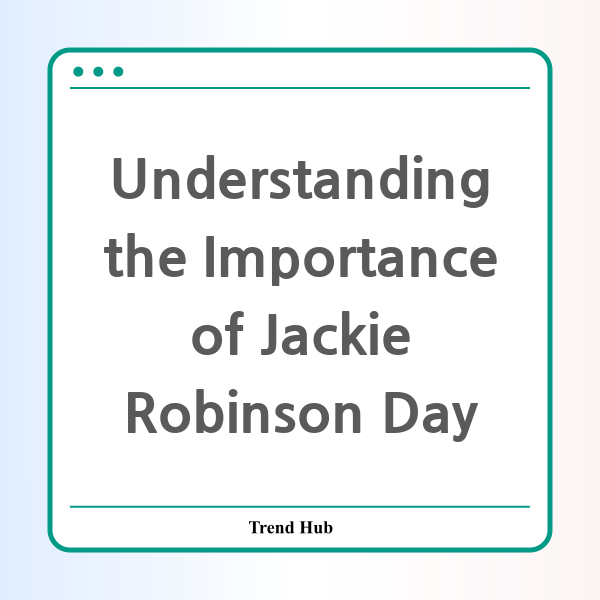* This website participates in the Amazon Affiliate Program and earns from qualifying purchases.

Jackie Robinson Day is an important annual celebration that honors the legacy of one of baseball's most influential figures. As we reflect on the significance of this day, we recognize not only Robinson's contributions to the sport but also the broader societal implications of his journey. Robinson broke Major League Baseball's color barrier on April 15, 1947, and his story is one that continues to resonate today, especially in light of current political climates and ongoing discussions about diversity, equity, and inclusion (DEI).
This year's Jackie Robinson Day commemorated the 78th anniversary of Robinson's debut, a moment that symbolizes the ongoing fight for civil rights and equality. Kareem Abdul-Jabbar, speaking at the Dodgers' annual celebration, highlighted the relevance of Robinson's legacy in today's world, particularly against a backdrop of political movements that seek to undermine DEI initiatives. "Jackie had an idea of what we had to confront. We had to confront segregation. In many ways, we're still confronting it," he stated, emphasizing the need for continuous advocacy and remembrance.
The Dodgers, who have been at the forefront of celebrating Robinson's impact, faced scrutiny this year as they navigated the political landscape surrounding their recent visit to the White House. Manager Dave Roberts defended the team's stance, insisting that the visit was about unity and support for the country, rather than conflicting ideologies. However, this prompts a larger conversation about how sports teams and leagues engage with social issues, particularly those that affect marginalized communities.
Recently, the MLB faced criticism for its decision to remove references to DEI initiatives from its Jackie Robinson Day communications, raising concerns about whether the league is distancing itself from the very principles that Robinson stood for. As Robinson himself exemplified perseverance in the face of adversity, the question arises: How can we ensure that his legacy remains a guiding force in promoting equality and representation in sports?
Roberts acknowledged the challenges of maintaining Robinson's legacy in a world where only three Black managers currently lead in Major League Baseball. He noted, "I think he would say we need to do better," emphasizing the necessity for change and representation in coaching and management positions across the league. This sentiment resonates deeply, as we consider the implications of representation not just in baseball, but across all fields.
Furthermore, the discussion around Jackie Robinson Day also raises awareness about the importance of educating fans and the public about Robinson's life and achievements. The annual celebration serves as a platform for reflection, urging individuals to recognize the sacrifices made by pioneers in the fight against inequality.
As we continue to celebrate Jackie Robinson Day, let us remember that the fight against discrimination and segregation is ongoing. The commemoration should inspire action—both in honoring Robinson's legacy and in pushing for a more inclusive environment in all aspects of society. Whether through sports, culture, or politics, the lessons learned from Robinson's life are invaluable as we advocate for a future where diversity is celebrated and all individuals are given equal opportunities.
In conclusion, Jackie Robinson's legacy is not confined to a single day or event; it is a call to action that encourages ongoing dialogue and commitment to equality. By embracing this legacy, we not only honor Robinson's memory but also pave the way for future generations to continue the fight for justice and inclusion.
* This website participates in the Amazon Affiliate Program and earns from qualifying purchases.